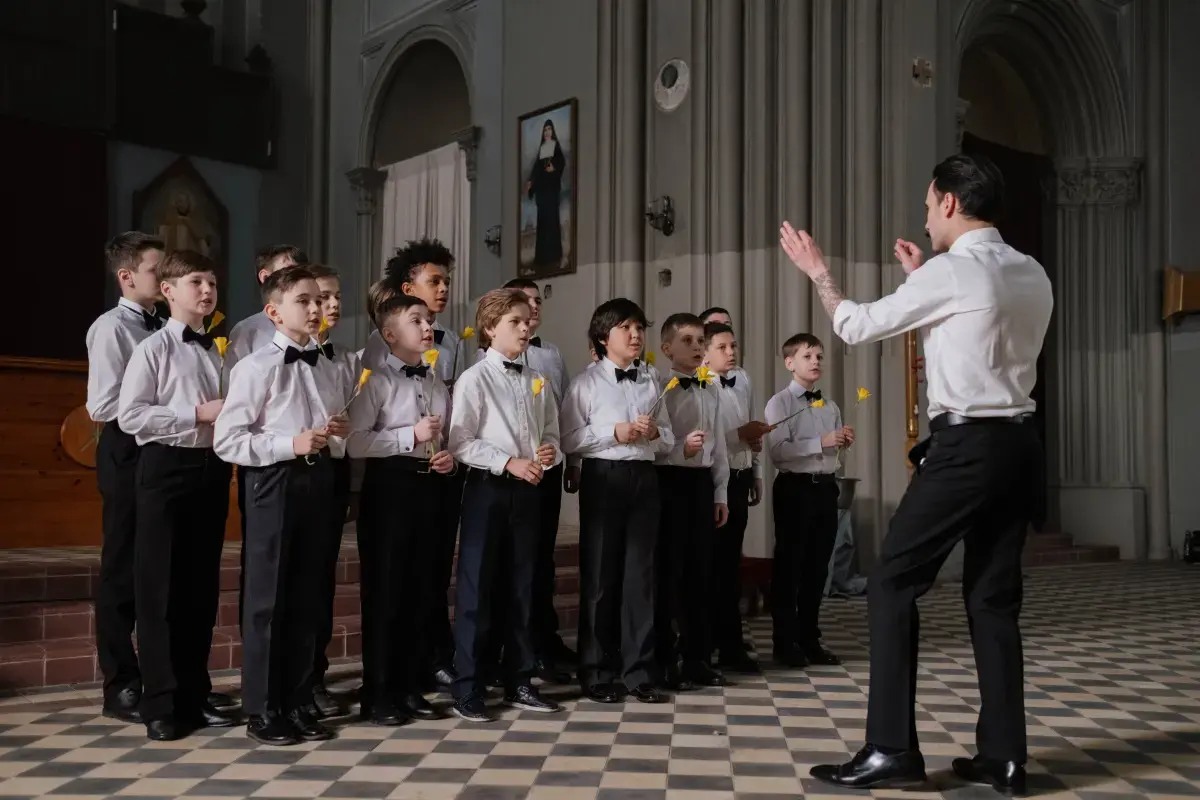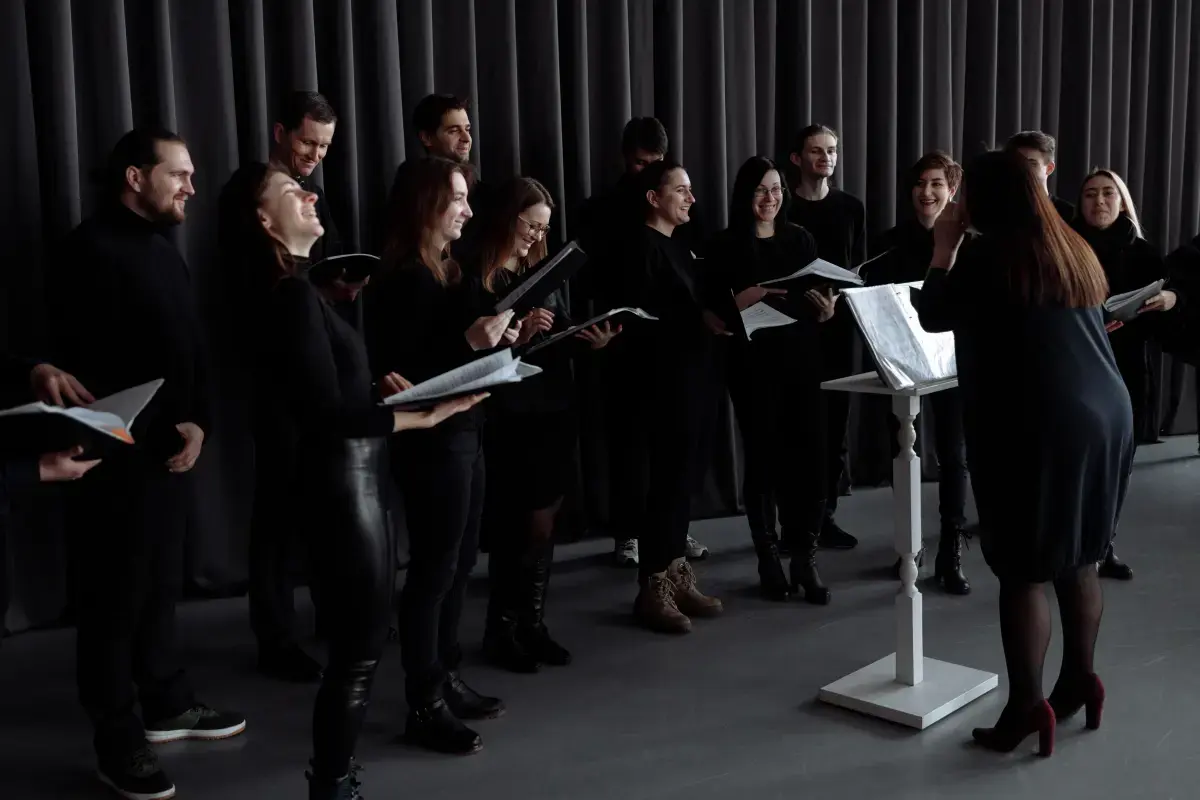
Conductor Job Description
What is a Conductor Professional?
A conductor is a person who leads an orchestra, choir, or other musical ensemble by directing the performance with hand gestures and giving verbal instructions. The primary duty of a conductor is to unify performers, helping them interpret the music as a whole while maintaining balance between instrumental and vocal parts. A secondary duty is to listen to the ensemble and make spontaneous decisions that will create the desired musical effect. Conductors typically require years of training and experience before they are able to lead professional-level ensembles. Although conductors do not usually play instruments during performances, many have some level of musicianship so they can better understand what each musician is capable of and how their instrument fits into the overall sound. During a performance, the conductor stands in front of the ensemble and uses hand gestures or baton technique to indicate tempo, dynamics, style, and other aspects of interpretation. In large ensembles, conductors may also use verbal instructions to help keep everyone on track. It is important for conductors to be able to convey their interpretation clearly so that the musicians can respond accordingly.

What does a Conductor Expert do?
One challenge that conductors face is dealing with mistakes made by musicians during a performance. If an individual musician makes a mistake, it is up to the conductor to decide whether or not to stop the music so it can be corrected. This can be difficult in fast-paced pieces where stopping would throw off the entire ensemble. In these cases, conductors must decide whether it is more important for the music to flow smoothly or for there to be complete accuracy. Another challenge for conductors is managing different personalities within an ensemble. Professional musicians are often highly skilled individuals who have spent many years perfecting their craft. As such, they may sometimes be resistant to direction from someone who they perceive as having less knowledge or experience than them. It is up to the conductor to gain respect from his or her musicians so that they are willing to follow directions and work together as an effective team.

What are the Skills of a Conductor?
A conductor needs a wide range of skills and experience in order to be successful. The most important skill for a conductor is the ability to lead and inspire musicians. A conductor must have the ability to communicate effectively with musicians, and must be able to instill a sense of confidence and trust in those they are leading.

What makes an Expert Conductor?
A conductor must also have extensive knowledge of music theory and repertoire, as well as the ability to sight-read music. In addition to these essential skills, a conductor must also have strong multitasking abilities. This is because conducting requires the coordination of many different elements at once, including keeping track of the tempo, dynamics, and Phrasing of the music, while also cueing and giving commands to the musicians. Finally, it is also important for a conductor to be physically fit, as they will often be required to stand for long periods of time while conducting.

What level of Experience & Qualifications are required to be a Conductor?
Industry Experience: A minimum of 5 years of experience in conducting choirs and orchestras, with a strong emphasis on classical music. 2. Training: Professional training from an accredited school or institution in conducting technique and musical theory. 3. Qualifications: Certification from the American Choral Directors Association (ACDA) or similar organization is preferred but not required; however, many organizations require certification as a prerequisite for certain positions. 4. Education: Bachelors degree in Music Performance, Conducting, Music Theory/Composition, or related field is strongly recommended; some employers may prefer applicants with Master’s degrees in these fields as well. Knowledge of various genres such as jazz and popular music is also helpful for those wishing to work with more diverse ensembles and groups outside of traditional choral settings

What is the Salary of a Conductor?
The salary expectations of a conductor can range from entry-level to senior level. At the entry-level, a conductor may expect to earn an hourly wage ranging from $15-$25 depending on experience and location. As the conductor gains more experience and training, they may be eligible for higher wages in the range of $30-$45 per hour. Additionally, some employers may offer bonuses or additional compensation such as paid holidays or health benefits. A junior or mid-level conductor will typically have several years of experience and can command salaries between $50,000-$75,000 annually with some having earning potential up to $90,000 per year based on performance and track record. Senior conductors usually have extensive knowledge and experience in their field that allows them to command higher salaries ranging from $100K-$150K annually depending on various factors such as geographic location and employer size/type. In addition to base pay these professionals often receive additional perks like company cars or housing allowances which further increase their overall remuneration package

What are the Working Conditions for a Conductor?
General working conditions for a conductor typically include long hours, irregular schedules, and physical labor. Conductors must be able to stand or walk most of their shifts and work in all types of weather. They may have to climb steps or ladders, bend over equipment, or lift heavy items. Conductors are subject to strict safety regulations and protocols while on the job; they must adhere to railroad rules and regulations at all times. Conductors also need good communication skills as they interact with passengers throughout their shift. They must be able to read maps accurately and carry out instructions from supervisors quickly and efficiently. In some cases, conductors may be responsible for operating switches, signaling other trains along the route, making announcements over the PA system in stations or cars, inspecting tracks before running a train across them, coupling/decoupling cars when necessary during stops or layovers at terminals/yards (a process which includes attaching air hoses between passenger cars), collecting tickets during travel time among other duties listed above.

What are the roles and responsibilities of a Conductor?
Batoning
Preparing the Orchestra
Rehearsing the Music
Leading the Orchestra
Communicating with Musicians
Planning Concerts
Conducting Research
Teaching Music Principles
Writing Musical Scores
Selecting Orchestral Pieces
Promoting Concerts
Serving as an Administrator
Collaborating with other Artists
Managing an Orchestra
Studying Music
Approving Rehearsal and Concert Venues
Hiring Musicians
Organizing Musicians Schedules
Auditioning Musicians
Conducting Orchestras and Choirs

Where can I find Conductor jobs?
- Create a profile on gigexchange and promote your Conductor skills to advertise you are Open to New Work Opportunities
- Ensure your Resume (or CV), or online work profile is up to date and represents your skills and experience. Ensure your reputation reflects your ability & attitude.
- Apply for Conductor Jobs advertised on gigexchange.
- Practise Conductor interview techniques to ensure you represent your personality and ability succinctly and confidently.
- Accept the job offer if the salary meets your expectations and the employer mission and purpose reflects your core values.
Jobs
What are the best job boards for Music Director jobs?

How can I hire Conductor staff online for my business?
The best job board for recruiting Conductor experts is gigexchange.com. Advertise full-time, part-time or contract jobs to find, hire & recruit trusted, experienced and talented Conductor candidates near you.

Are Conductor roles in demand in 2026?
Conductor experts are still in high demand in 2026. If you are an experienced Conductor or looking to train and become one. The job market is looking strong for Conductor jobs near me.